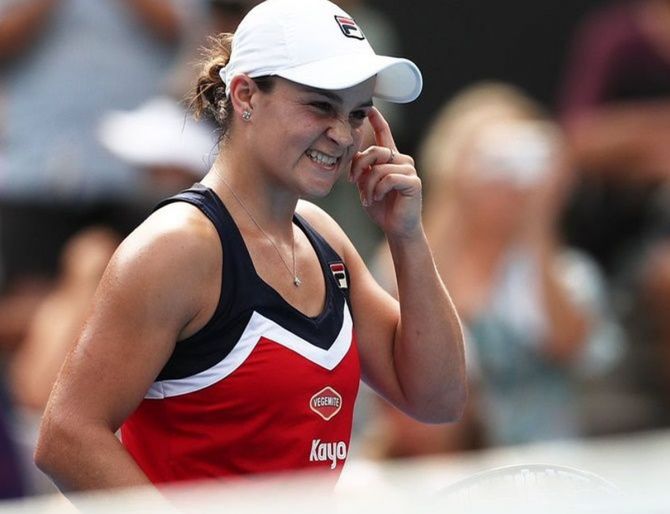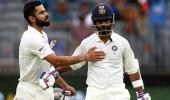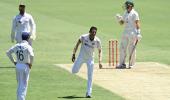
World number one Ashleigh Barty is itching to get back to competitive tennis at the Australian Open but has poured cold water on the idea that she might be set to end the 43-year wait for a homegrown women's champion.
Barty reached the semi-finals at Melbourne Park for the first time last year before sitting out most of the rest of the season at home because of the COVID-19 pandemic.
The 24-year-old remains Australia's best hope of singles success when the year's first Grand Slam starts on Feb. 8 but Barty urged her compatriots not to get their hopes up.
"They can think whatever they like. If they expect me to win the tournament, then that's their expectations," Barty told the Australian Associated Press on Saturday.
"But mine certainly aren't that for now. It's about doing the right things right from the start, from the very first match. If it's good enough, it is. And if it's not, it's not. But that's OK."
Barty last played a tournament match at the Qatar Open last February, deciding to remain at home in the relative safety of Queensland rather than travel to New York for the U.S. Open or to Paris for her French Open title defence.
"Obviously I haven't played competition tennis for a year now so it's going to be a challenge but we also know that hopefully again it will be a long season and we don't have to panic if we don't get the perfect start," she added.
"We'll just try and go out there and do the best that we can and whatever happens will happen. I feel ready to go and I'm just itching to get started."
Barty did not need to quarantine before the Australian Open and will play an exhibition event in Adelaide on Friday before returning to Melbourne for the Grand Slam.
Spanish federation apologises to Tennis Australia over player quarantine
Spain's tennis federation (RFET) on Saturday apologised to Tennis Australia (TA) after complaining about the treatment of two Spanish players in quarantine before next month's Australian Open.
More than 70 players have been confined to their rooms after some passengers on three charter flights that brought them to Australia tested positive for the new coronavirus. Other players are able to train for up to five hours a day.
"We apologise to TA if our statement has at any time been interpreted as a criticism of their working methods, nothing is further from our intention," RFET said in a statement.
The federation had said on Thursday said two players -- Mario Vilella and Carlos Alcaraz -- had not been informed they would be strictly confined if they were on a flight with someone who tested positive "regardless of the physical proximity".
In the earlier statement it said it was clear the duo would not be able to compete on "equal terms" at the major and the confinement could result in physical and psychological harm.
On Saturday RFET said its intention had been "to request the Australian Open, with utmost respect for their skills, the possibility of exploring safe training options for Spanish players affected by isolation for 14 days."
"This initiative is based on good faith and in no way calls into question the actions of the Australian Government or the Australian Open."
On Saturday, there were three new cases recorded among international arrivals in hotel quarantine in Victoria. It was not made clear whether the new cases were linked to the Australian Open.
Spain's Paula Badosa on Thursday became the first player who had entered for the Grand Slam to confirm a positive test.
"The RFET thanks TA for the effort to organise, in these difficult moments due to the pandemic, the first Grand Slam of the season, something vital for our players who are going to compete again and generate resources," RFET added.
The Australian Open begins on February 8 in Melbourne, the state capital of Victoria.
Bencic hopes Open organisers make it fair for players in isolation
Swiss Belinda Bencic said players could get injured if they have to compete immediately after a hard quarantine in Melbourne and hoped Australian Open organisers would make the situation fairer for those confined to their rooms for 14 days.
The world number 12 is one of the 72 players who are not allowed to leave their hotel rooms in Melbourne after some passengers on the three charter flights that brought them to Australia tested positive.
Their fellow competitors, who travelled on charter flights which did not return any positive cases, are also in isolation but are able to spend five hours a day outside their rooms to practise for the year's first Grand Slam.
At the end of isolation the players are scheduled to participate in tune-up events from Jan. 31 at Melbourne Park before the Feb. 8-31 Grand Slam at the same venue.
"Now I feel more positive about it and I'm trying to do the most I can do to get out of quarantine," Bencic, 23, told reporters on a video conference call from her room on Friday.
"The priority is to not get injured as that is I feel like the biggest risk. Being in the room for 14 days and then playing a tournament the next day or we have two days in between, it's just really a big risk.
"The tennis level will not be there, but we can just try and do our best."
It was initially difficult for 23-year-old Bencic to accept the situation while her colleagues were able to train and prepare for the Grand Slam.
The Swiss, who is joined by her coach and boyfriend in the room, spends most of her time sleeping and cannot wait to breathe fresh air and be out in the sun when her isolation ends.
"I'm trying to play tennis," she said, ruing that her hard work in pre-season has gone to waste.
"We tried to move the bed and the furniture into the bathroom or into the hallway and then I tried to hold the racket, play tennis, kind of simulate so my muscles don't forget and they are still active."
Australian Open boss Craig Tiley has ruled out any change to the schedule of the Grand Slam but has said that organisers were contemplating moving back the lead-up events to allow more time for those in hard quarantine.
"The main priority is to make it as equal as possible for all the players competing because of course, in this weird situation it's far from equal," Bencic said.
"Many players have a much bigger advantage. It's not like there's only one or two players in quarantine but there's 72.
"I think they are doing the best they can to make it (if) not completely equal and fair options... the closest that it can be."












